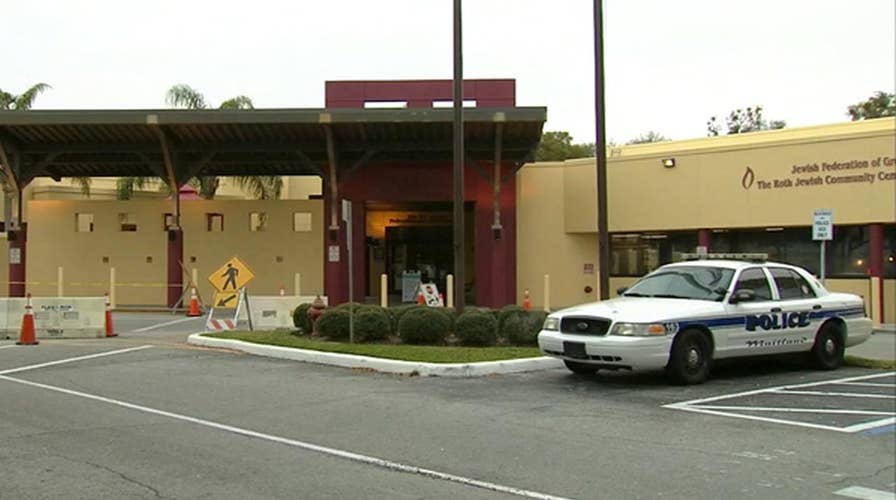Israeli man arrested for threats targeting US Jewish centers
19-year-old suspect arrested for bomb threats
Holocaust Memorial Day (Yom Hashoah) 2017 finds Jews deeply worried.
Here in the United States, we’ve witnessed cemetery desecrations, little children evacuated from Jewish Community Centers, and a 45 percent spike in anti-Jewish incidents across America’s elite campuses.
In England, we see too many Labourites injecting anti-Jewish animus into the political mainstream.
In France, we saw the far-right Marine Le Pen declar on national TV that France was not responsible for the Vél d'Hiv roundup of July 1942, when French police arrested more than 13,000 Jews, detained them for five days in Paris’ Vélodrome d'Hiver cycling stadium and then deported them to Auschwitz. We also saw a French judge refuse to press hate crimes charges against criminals who admitted they chanted anti-Semitic threats during their rape and rampage against a Jewish couple.
In 2017, we saw - for the first time since 1945 - a Jewish institution forced to close because of overt Nazi threats. No, not in Germany but in Sweden, where the JCC in Umea was closed after being desecrated with swastikas and after Jews received threatening phone calls. A known neo-Nazi group, Nordfront, is reportedly behind the threats.
Lamented one Jewish parent: "My mother and father are (Holocaust) survivors, so this is not OK. Enough is enough. It was like stepping into their shoes in the 1930s."
And in Iran, the Mullahocracy continues to deny the Holocaust while parading ballistic missiles bearing threats to annihilate the Jewish State and fulfill Hitler’s vision.
Perhaps then, this Yom Hashoah, Jews could be forgiven if they focus exclusively on take caring of their own.
But Rabbi Yisrael Meir Lau, former chief Rabbi of Israel, disagrees.
Rabbi Lau was an eight-year-old Shoah survivor when he reached Israel just three months after WWII ended.
Seventy-two years later he invokes the specter of the Holocaust to demand that Israel do more to help the people of Syria, an implacable enemy of the Jewish state.
“This is certainly a shoah of the Syrian people and it did not start today,” Rabbi Lau said. “For the past six years they have been living in a Holocaust.” .
Lau added that as “a nation that has suffered more than any other nation,” Israel must go in and help Syrian civilians, dozens of whom had just been killed in a chemical attack.
He is not alone: Israel’s Sephardic chief rabbi, Yitzhak Yosef, likewise called the war in Syria “a small Holocaust.”
“The people of Israel underwent a horrible Holocaust 70 years ago,” Yosef said. “Millions of Jews were murdered … and the world saw and remained silent; we as Jews who felt this silence in our own flesh cried out for years, we asked how the world knew and remained silent? … As Jews it is forbidden for us to remain silent … Genocide cannot be ignored, not in Syria and not anywhere, and not against any people, even if they are not our friends.”
Why would Rabbi Lau invoke the Shoah?
First of all, because the images of those little children gassed to death just hundreds of miles from Tel Aviv rekindled in him the nightmares of an eight year old boy.
Of course, he knows from brutal experience that Ilbid and Auschwitz cannot be compared. The Nazi Holocaust was unique in the annals of all human history - in its scope, its barbarity and because it targeted for annihilation an “enemy” that posed no military threat nor controlled any territory. Six million Jews were hunted down, ghettoized, starved and mass murdered by the Nazis and their enthusiastic collaborators across Europe.
But I believe that Rabbi Lau used the Shoah imagery because he understood what the other goal of the Nazis was: Not just killing Jewish lives-- including his sainted rabbinic father-- but annihilating Jewish Life.
Rabbi Lau’s call to action emphasizes a central Jewish value: “Lo taamod al dam réakha.” (Leviticus 19:16) – “Thou shall not stand idly by the shedding of the blood of thy fellow man.”
As the late Elie Wiesel explained: ‘The word is not “akhikha,” thy Jewish brother, but “réakha,” thy fellow human being, be he or she Jewish or not. All are entitled to live with dignity and hope. All are entitled to live without fear and pain.’
From the moment he arrived in1945, Lau believed that each day that he lived in Israel was another defeat for Nazism and all the contemporary genocide wannabees-- from Iran and ISIS to Hezbollah and Hamas.
But Rabbi Lau also believes that for us Jews, survival-- from Egypt to Auschwitz--has always been just the beginning. We have values to live up to; the very values that the Nazis sought to obliterate.
“Lo taamod al dam réakha” – “Do not stand idly by while others – even your enemies – bleed.”
That, the Torah teaches, is what separates civilized people from barbarity.
That too, is our challenge on this Yom Hashoah.

